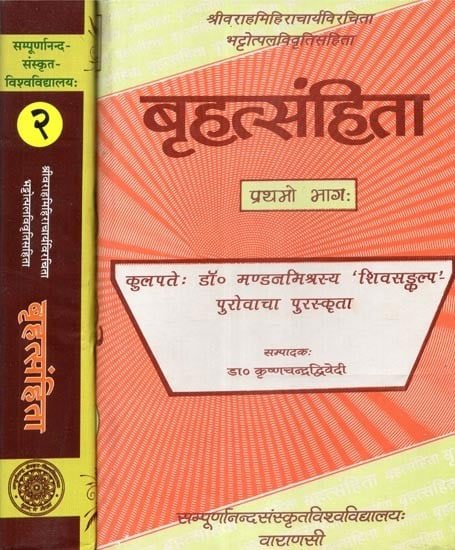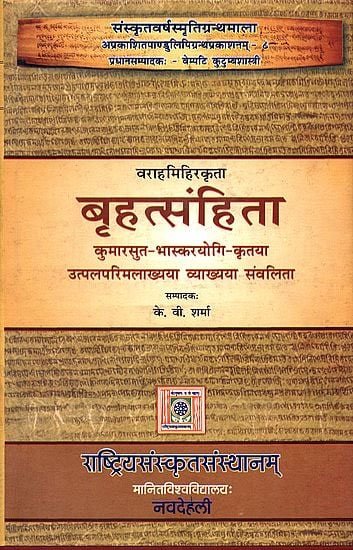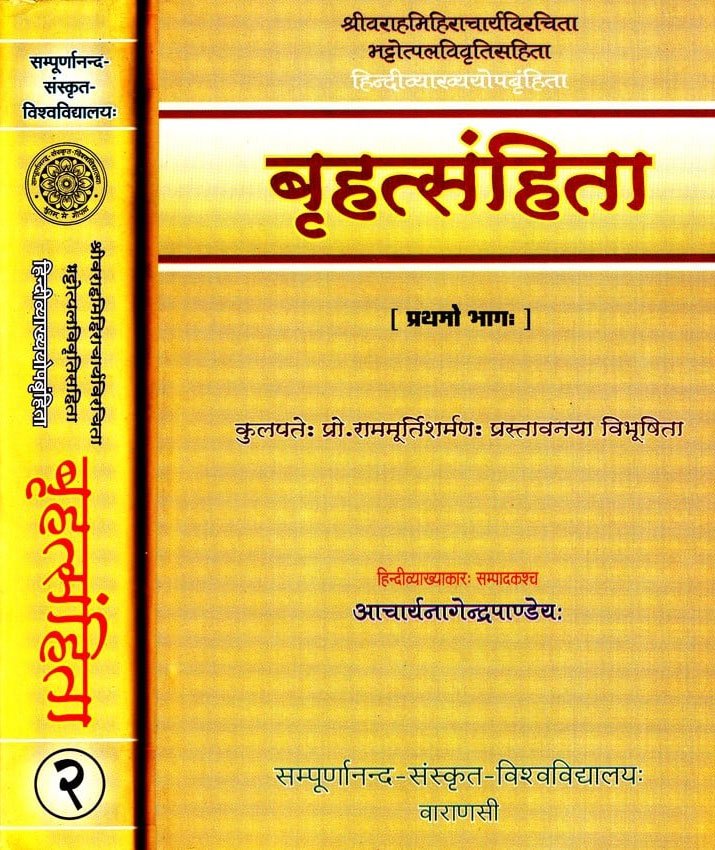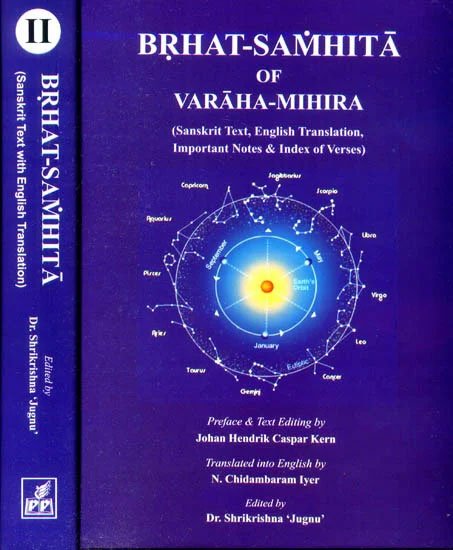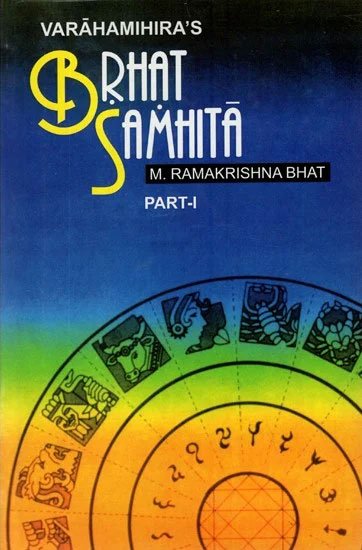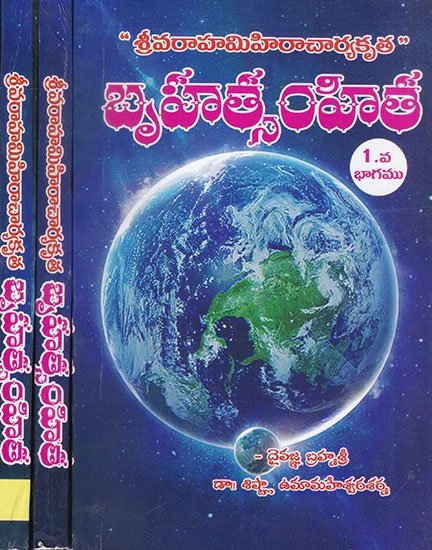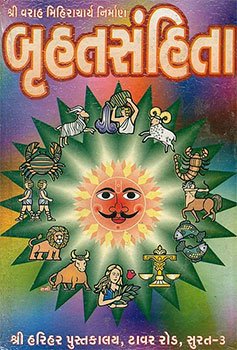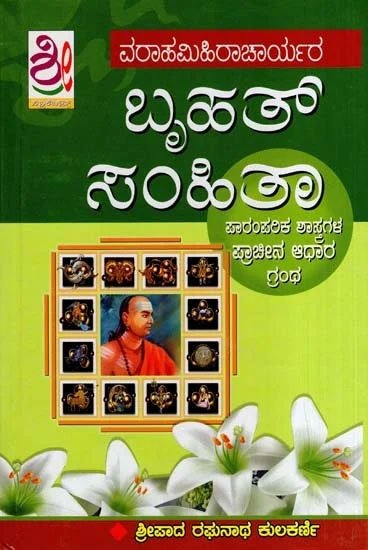Brihat-samhita [sanskrit]
26,560 words
The Sanskrit text of the Brihat-samhita from the 6th-century authored by Varaha Mihira in present-day Ujjain, India. It primarily deals with astrology and astronomy but is presented as an encyclopedia of knowledge.
Verse 46.16
धनुःस्थायी रूक्षो रुधिरसदृशः क्षुद्भयकरो बलोद्योगं चन्द्रः कथयति जयं ज्यास्य च यतः ।
गवां शृङ्गो गोघ्नो निधनमपि सस्यस्य कुरुते ज्वलन्धूमायन्वा नृपतिमरणायैव भवति ॥ १६ ॥
[चेन्दुः]
dhanuḥsthāyī rūkṣo rudhirasadṛśaḥ kṣudbhayakaro balodyogaṃ candraḥ kathayati jayaṃ jyāsya ca yataḥ |
gavāṃ śṛṅgo goghno nidhanamapi sasyasya kurute jvalandhūmāyanvā nṛpatimaraṇāyaiva bhavati || 16 ||
[cenduḥ]
The Sanskrit text of Verse 46.16 is contained in the book Brihata Samhita (Sanskrit Text with Hindi Translation) by Pandit Achyutananda Jha. This book is available online or you could buy the latest edition:
Read online Buy now! The Sanskrit text by Pandit Achyutananda Jha (2001)
Glossary of Sanskrit terms
Note: This extracts Sanskrit terms and links to English definitions from the glossary, based on an experimental segmentation of verse (46.16). Some terms could be superfluous while some might not be mentioned. Click on the word to show English definitions.
Dhanu, Dhanus, Sthayi, Sthayin, Ruksha, Rudhira, Sadrish, Sadrisha, Kshudbhaya, Karas, Kara, Bala, Udyoga, Candra, Kathayat, Jaya, Jya, Asya, Yatah, Yat, Yata, Gava, Shringa, Goghna, Gohan, Nidhana, Api, Sasya, Kuruta, Jvalat, Dhuma, Nripati, Arana, Bhavati, Bhavat, Bhavant,
Analysis of Sanskrit grammar
Note: this is an experimental feature and only shows the first possible analysis of the Sanskrit text (Verse 46.16). If the system was successful in segmenting the sentence, you will see of which words it is made up of, generally consisting of Nouns, Pronouns, Verbs, Participles and Indeclinables. Click on the link to show all possible derivations of the word.
- Line 1: “dhanuḥsthāyī rūkṣo rudhirasadṛśaḥ kṣudbhayakaro balodyogaṃ candraḥ kathayati jayaṃ jyāsya ca yataḥ ”
- dhanuḥ -
-
dhanus (noun, neuter)[compound], [adverb], [nominative single], [vocative single], [accusative single]dhanu (noun, feminine)[nominative single]dhanu (noun, masculine)[nominative single]
- sthāyī -
-
sthāyi (noun, feminine)[nominative dual], [vocative dual], [accusative dual]sthāyin (noun, masculine)[nominative single]
- rūkṣo* -
-
rūkṣa (noun, masculine)[nominative single]
- rudhira -
-
rudhira (noun, masculine)[compound], [vocative single]rudhira (noun, neuter)[compound], [vocative single]
- sadṛśaḥ -
-
sadṛś (noun, masculine)[nominative plural], [vocative plural], [accusative plural], [ablative single], [genitive single]sadṛś (noun, neuter)[ablative single], [genitive single]sadṛśa (noun, masculine)[nominative single]
- kṣudbhaya -
-
kṣudbhaya (noun, masculine)[compound], [vocative single]kṣudbhaya (noun, neuter)[compound], [vocative single]
- karo* -
-
karas (noun, neuter)[compound], [nominative single], [vocative single], [accusative single]kara (noun, masculine)[nominative single]
- balo -
-
bala (noun, masculine)[compound], [vocative single]bala (noun, neuter)[compound], [vocative single]balā (noun, feminine)[nominative single]√bal (verb class 1)[imperative active second single]
- udyogam -
-
udyoga (noun, masculine)[adverb], [accusative single]
- candraḥ -
-
candra (noun, masculine)[nominative single]
- kathayati -
-
√kath -> kathayat (participle, masculine)[locative single from √kath class 10 verb]√kath -> kathayat (participle, neuter)[locative single from √kath class 10 verb]√kath (verb class 10)[present active third single]
- jayam -
-
jaya (noun, masculine)[adverb], [accusative single]jaya (noun, neuter)[adverb], [nominative single], [accusative single]jayā (noun, feminine)[adverb]
- jyā -
-
ji (noun, masculine)[compound], [adverb], [nominative dual], [vocative dual], [accusative dual]ji (noun, neuter)[compound], [adverb], [nominative single], [vocative single], [accusative single]ji (noun, feminine)[compound], [adverb], [nominative dual], [vocative dual], [accusative dual], [instrumental single]jī (noun, masculine)[compound], [adverb]jya (noun, masculine)[compound], [vocative single]jya (noun, neuter)[compound], [vocative single]jyā (noun, feminine)[nominative single]
- āsya -
-
āsya (noun, masculine)[compound], [vocative single]āsya (noun, neuter)[compound], [vocative single]√ās -> āsya (participle, masculine)[compound from √ās]√ās -> āsya (participle, neuter)[compound from √ās]√as -> āsya (participle, masculine)[compound from √as]√as -> āsya (participle, neuter)[compound from √as]√ās -> āsya (absolutive)[absolutive from √ās]√ās -> āsya (absolutive)[absolutive from √ās]√as -> āsya (absolutive)[absolutive from √as]√ās -> āsya (participle, masculine)[vocative single from √ās]√ās -> āsya (participle, neuter)[vocative single from √ās]√as -> āsya (participle, masculine)[vocative single from √as]√as -> āsya (participle, neuter)[vocative single from √as]
- ca -
-
ca (indeclinable conjunction)[indeclinable conjunction]ca (noun, masculine)[compound], [vocative single]ca (noun, neuter)[compound], [vocative single]
- yataḥ -
-
yataḥ (indeclinable relative)[indeclinable relative]yataḥ (indeclinable)[indeclinable]yat (noun, masculine)[accusative plural], [ablative single], [genitive single]yat (noun, neuter)[ablative single], [genitive single]yata (noun, masculine)[nominative single]√i -> yat (participle, masculine)[accusative plural from √i class 2 verb], [ablative single from √i class 2 verb], [genitive single from √i class 2 verb]√i -> yat (participle, neuter)[ablative single from √i class 2 verb], [genitive single from √i class 2 verb]√yam -> yata (participle, masculine)[nominative single from √yam class 1 verb]
- Line 2: “gavāṃ śṛṅgo goghno nidhanamapi sasyasya kurute jvalandhūmāyanvā nṛpatimaraṇāyaiva bhavati || 16 |”
- gavām -
-
go (noun, masculine)[genitive plural]gavā (noun, feminine)[accusative single]
- śṛṅgo* -
-
śṛṅga (noun, masculine)[nominative single]
- goghno* -
-
goghna (noun, masculine)[nominative single]gohan (noun, masculine)[accusative plural], [ablative single], [genitive single]
- nidhanam -
-
nidhana (noun, masculine)[adverb], [accusative single]nidhana (noun, neuter)[adverb], [nominative single], [accusative single]nidhanā (noun, feminine)[adverb]
- api -
-
api (indeclinable preposition)[indeclinable preposition]ap (noun, neuter)[locative single]
- sasyasya -
-
sasya (noun, masculine)[genitive single]sasya (noun, neuter)[genitive single]
- kurute -
-
kurutā (noun, feminine)[nominative dual], [vocative single], [vocative dual], [accusative dual]kuruta (noun, masculine)[locative single]kuruta (noun, neuter)[nominative dual], [vocative dual], [accusative dual], [locative single]√kṛ (verb class 8)[present middle third single]
- jvalan -
-
jvalat (noun, masculine)[nominative single], [vocative single]√jval -> jvalat (participle, masculine)[nominative single from √jval class 1 verb], [vocative single from √jval class 1 verb]
- dhūmāya -
-
dhūma (noun, masculine)[dative single]
- nvā -
-
- nṛpatim -
-
nṛpati (noun, masculine)[accusative single]
- araṇāyai -
-
araṇa (noun, masculine)[dative single]araṇa (noun, neuter)[dative single]araṇā (noun, feminine)[dative single]
- aiva -
-
√i (verb class 2)[imperfect active first dual]
- bhavati -
-
bhavatī (noun, feminine)[adverb], [vocative single]bhavat (noun, masculine)[locative single]bhavat (noun, neuter)[locative single]bhavant (pronoun, masculine)[locative single]bhavant (pronoun, neuter)[locative single]√bhū (verb class 1)[present active third single]
- Cannot analyse 16
Other editions:
Also see the following editions of the Sanskrit text or (alternative) English translations of the Verse 46.16
Brhatsamhita with the Commentary of Bhattotpala
by Krishna Chandra Dwivedi (2016)
Publisher: Sampurnanand Sanskrit University; 1229 pages;
Buy now!
Brihat Samhita with the Commentary of Utpalapatimala of Yogisvara
by K. V. Sharma (2012)
Publisher: Rashtriya Sanskrit Sansthan, Janakpuri; 754 pages; ISBN-10; 8186111360; ISBN-13: 9788186111369
Buy now!
Brihat Samhita (Hindi Translation)
by K. V. Sharma (2002)
Publisher: Sampurnanand Sanskrit University; 2359 pages; ISBN-13: 9789387890008.
Buy now!
Brhat Samhita (English translation)
by N. Chidambaram Iyer (2022)
Publisher: Parimal Publication Pvt. Ltd.; 801 pages; Edited by Dr. Shrikrishna Jugnu; ISBN-10: 8171104215; ISBN-13: 9788171104215.
Buy now!
Brhat Samhita (English with notes)
by M. Ramakrishna Bhat (2010)
Publisher: Motilal Banarsidas Publishers Pvt. Ltd.; 1155 pages; ISBN-10: 8120810600; ISBN-13: 9788120810600.
Buy now!
Brhat Samhita (Telugu translation)
by Sishtla Umamaheswara Sharma (2020)
Publisher: Mohan Publications, Andhra Pradesh; 846 pages.
Buy now!Preview of verse 46.16 in Kannada sript:
ಧನುಃಸ್ಥಾಯೀ ರೂಕ್ಷೋ ರುಧಿರಸದೃಶಃ ಕ್ಷುದ್ಭಯಕರೋ ಬಲೋದ್ಯೋಗಂ ಚನ್ದ್ರಃ ಕಥಯತಿ ಜಯಂ ಜ್ಯಾಸ್ಯ ಚ ಯತಃ ।
ಗವಾಂ ಶೃಙ್ಗೋ ಗೋಘ್ನೋ ನಿಧನಮಪಿ ಸಸ್ಯಸ್ಯ ಕುರುತೇ ಜ್ವಲನ್ಧೂಮಾಯನ್ವಾ ನೃಪತಿಮರಣಾಯೈವ ಭವತಿ ॥ ೧೬ ॥
[ಚೇನ್ದುಃ]
Brhat Samhita (Gujarati translation)
by - (2000)
Publisher: Shree Harihar Pustakalay, Surat; Author: Shri Varahamihira Acharya (શ્રી વરાહમિહીરાચાર્ય); 432 pages.
Buy now!Preview of verse 46.16 in Gujarati sript:
ધનુઃસ્થાયી રૂક્ષો રુધિરસદૃશઃ ક્ષુદ્ભયકરો બલોદ્યોગં ચન્દ્રઃ કથયતિ જયં જ્યાસ્ય ચ યતઃ ।
ગવાં શૃઙ્ગો ગોઘ્નો નિધનમપિ સસ્યસ્ય કુરુતે જ્વલન્ધૂમાયન્વા નૃપતિમરણાયૈવ ભવતિ ॥ ૧૬ ॥
[ચેન્દુઃ]
Brhat Samhita (Kannada translation)
by Sripada Raghunatha Kulkarni (2021)
Publisher: Srinidhi Publications, Bangalore; 668 pages with illustrations.
Buy now!Preview of verse 46.16 in Kannada sript:
ಧನುಃಸ್ಥಾಯೀ ರೂಕ್ಷೋ ರುಧಿರಸದೃಶಃ ಕ್ಷುದ್ಭಯಕರೋ ಬಲೋದ್ಯೋಗಂ ಚನ್ದ್ರಃ ಕಥಯತಿ ಜಯಂ ಜ್ಯಾಸ್ಯ ಚ ಯತಃ ।
ಗವಾಂ ಶೃಙ್ಗೋ ಗೋಘ್ನೋ ನಿಧನಮಪಿ ಸಸ್ಯಸ್ಯ ಕುರುತೇ ಜ್ವಲನ್ಧೂಮಾಯನ್ವಾ ನೃಪತಿಮರಣಾಯೈವ ಭವತಿ ॥ ೧೬ ॥
[ಚೇನ್ದುಃ]
![Brihat-samhita [sanskrit] - book cover](/uploads/a/Brihat-Samhita-Sanskrit.jpg)
